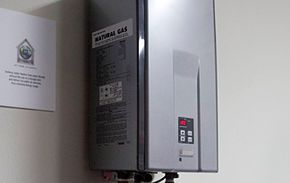Electricity may seem like the cheap, green way to go, but natural gas is also a popular choice for energizing many common indoor and outdoor appliances. And with good reason, too -- this fossil fuel is efficient, reliable, economical and environmentally friendly. In fact, it may surprise you to learn that natural gas is actually considered the cleanest fossil fuel. It emits 45 percent less carbon dioxide than coal and 27 percent less carbon dioxide than oil, so it's safe to say that choosing natural gas appliances is a responsible way to help reduce greenhouse gas emissions. It's easy on your wallet as well, helping you save money when compared to other conventional energy sources available for residential use: According the U.S. Department of Energy, it costs about 68 percent less than electricity per British thermal unit (Btu), the standard measure of energy. While the initial cost of natural gas appliances may be slightly more than electric options, the long-term operating costs can be significantly lower, especially for heating, cooking, and drying clothes. (Just make sure that your home has natural gas lines available to hook up your new appliances, or the cost of installing new lines can outweigh the long-term savings in operating costs.)
Homeowners have chosen natural gas appliances for cooking and heating for decades, while other appliances are relatively new on the market. For example, natural gas air conditioning is relatively new and growing in popularity because it's efficient and eco-friendly. Natural gas furnaces have been around longer and are a more popular choice because they help heat your home faster than conventional heating methods. In fact, air from such a furnace can be up to 25 degrees warmer right out of the vent than an electric heat pump. Natural gas is one of the most popular fuels for residential heating, used in about 56 percent of U.S. households, according to the American Gas Association.
Advertisement
